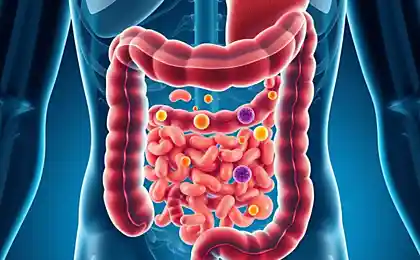199
Anorexia and bulimia - how to recognize food addiction
We can talk about delicious food for hours. The topic of diets is also one of the top among women. But overeating or malnutrition is rarely discussed. Meanwhile, these serious eating disorders are included in the International Classification of Diseases. Anorexia, bulimia – these words are familiar to many women, but the idea of these disorders is very weak.
Anorexia nervosa Most often occurs in adolescence, mainly in girls. Men suffer from this disorder, according to experts, in 5-10% of cases. Relatives may not notice for a long time that something is wrong with their loved ones. It just melts in front of our eyes, but only when it finally becomes like a “soup set”, others realize that they can not remember the last time he ate. There are also oddities in the choice of products.
Symptoms:
1. Weight loss is achieved by limiting the total amount of food consumed. To this may be added the inducing of vomiting, the use of laxatives and diuretics and intentional excessive physical overload.
2. A huge fear of growing fat, even if the real weight does not reach the norm. Thus, a refusal to maintain body weight at the minimum level for their age and height is formed.
3.A change in perception of one’s own weight or body shape, the dependence of self-esteem on these criteria, and the denial of the fact that body weight is abnormally low. Even if, objectively, only her own skeleton remains from the girl, she will still seem, her butt is huge, and her stomach needs to be removed. Weight loss is a victory of will and weight gain is a loss of control.
4.In adolescent girls, anorexia entails a late appearance of menstruation, and in women during puberty, amenorrhea may be observed (the absence of at least three consecutive menstrual cycles).
What is it? No one has ever seen laughing and cheerful anorexics, because changes occurring in the body at the biochemical level lead to a deterioration in mood, irritability, insomnia, and a decrease in sexual interest. All this can lead to serious depression. Paradoxically, women suffering from anorexia sometimes tend to collect recipes and create food stocks. They may also feel uncomfortable when they need to eat in the company of others.
Why are they doing this?
• A sacrifice for the family. In this case, anorexia occurs at the moment when the family, or rather, the parents are experiencing a crisis. Then the teenager becomes the object of close attention and care of parents, which unites them and does not allow the family to fall apart.
• Secondary benefits. A person, without receiving the approval and sympathy of others, can try to deserve them with his illness.
• Total control. Anorexia is a way to control your body and your life. It is often observed in girls who grew up in dysfunctional families, those who became independent early and took responsibility for what is happening in the family.
• Anorexia is a way to manage emotions. Uncertainty and fear of failure push to find ways to get rid of them. With the help of refusal to eat, it is gradually possible to cause a real anesthesia and insensitivity in the emotional sphere.
bulimia nervosa It seems that I just wanted to have a snack, and then it turns out that the refrigerator is treacherously empty. And you don't understand, how is that? We know less about bulimia than we do about anorexia, because those who suffer from it are embarrassed by their pathological habits and try to hide them. Bulimic crises appear alone behind closed doors in an almost secretive environment.
Symptoms:
1.Frequently recurring episodes of binge eating, in which, over a period of time (usually not more than two hours), an amount of food is eaten significantly more than what any other person in similar conditions can eat. There may be a sense of loss of control, such as the belief that it is impossible to stop eating. But despite the lack of strength to resist the urge to eat, a bulimic can stop if someone enters the room.
2.The desire to compensate for this to insure against weight gain. This can be inducing vomiting, using laxatives and diuretics, cleansing procedures, fasting in the following days, and excessive physical activity.
3.Episodes of binge eating and compensatory behavior occur about twice a week for every three months.
4. Self-esteem depends on the shape and weight of the body.
What is it? People with bulimia can have a normal weight, sometimes it can become higher or lower. However, this does not save from mood fluctuations, self-doubt and depression. In a third of cases, this is accompanied by dependence on alcohol and stimulant drugs. Suffering from bulimia falls on advertising means for weight loss.
Why are they doing this?
• Unstoppable absorption of food saves from frightening reality. Eating is a pleasure in itself, and over time it becomes a way to comfort yourself when faced with difficulties in interpersonal communication. I hide behind a layer of fat to protect myself from the threats of this cruel world.
• The only pleasure in life. Often occurs in women 45-50 years after the separation of children. They are fully invested in the upbringing of children, and the motherhood role is difficult to replace. Food becomes a pleasant compensation, a way to fill the void.
• Like a swing. For some time, a diet is followed, followed by food breakdowns. This causes fluctuations in weight between optimal and exceeding it by 5-6 kilograms. Interestingly, as soon as a normal weight is reached, there is a feeling that attractiveness is dangerous and then bouts of gluttony resume. Restore the protective layer of fat more familiar and calmer.
Other eating disorders
1) All criteria for anorexia nervosa are present, but the menstrual cycle is not disrupted.
2) All symptoms are also observed, but despite significant weight loss, it remains within normal limits.
(3) There are all signs of bulimia nervosa, but overeating and compensation crises are less common than twice a week for three months.
(4) Chewing and spitting without swallowing large amounts of food
(5) Systematic uncontrolled overeating, but without vomiting and without the use of laxatives and diuretics
What do I do?
As practice shows, attempts to cope with the problem independently do not give a result, since the emphasis is on controlling food consumption, while eating disorders are a symptom of deeper internal difficulties. This requires contacting a psychologist or psychotherapist. Sometimes these disorders require the intervention of a psychiatrist, since a persistent desire to lose weight, despite a huge mass deficit, can be a sign of a more serious disorder.

Source: domashniy.ru/
Anorexia nervosa Most often occurs in adolescence, mainly in girls. Men suffer from this disorder, according to experts, in 5-10% of cases. Relatives may not notice for a long time that something is wrong with their loved ones. It just melts in front of our eyes, but only when it finally becomes like a “soup set”, others realize that they can not remember the last time he ate. There are also oddities in the choice of products.
Symptoms:
1. Weight loss is achieved by limiting the total amount of food consumed. To this may be added the inducing of vomiting, the use of laxatives and diuretics and intentional excessive physical overload.
2. A huge fear of growing fat, even if the real weight does not reach the norm. Thus, a refusal to maintain body weight at the minimum level for their age and height is formed.
3.A change in perception of one’s own weight or body shape, the dependence of self-esteem on these criteria, and the denial of the fact that body weight is abnormally low. Even if, objectively, only her own skeleton remains from the girl, she will still seem, her butt is huge, and her stomach needs to be removed. Weight loss is a victory of will and weight gain is a loss of control.
4.In adolescent girls, anorexia entails a late appearance of menstruation, and in women during puberty, amenorrhea may be observed (the absence of at least three consecutive menstrual cycles).
What is it? No one has ever seen laughing and cheerful anorexics, because changes occurring in the body at the biochemical level lead to a deterioration in mood, irritability, insomnia, and a decrease in sexual interest. All this can lead to serious depression. Paradoxically, women suffering from anorexia sometimes tend to collect recipes and create food stocks. They may also feel uncomfortable when they need to eat in the company of others.
Why are they doing this?
• A sacrifice for the family. In this case, anorexia occurs at the moment when the family, or rather, the parents are experiencing a crisis. Then the teenager becomes the object of close attention and care of parents, which unites them and does not allow the family to fall apart.
• Secondary benefits. A person, without receiving the approval and sympathy of others, can try to deserve them with his illness.
• Total control. Anorexia is a way to control your body and your life. It is often observed in girls who grew up in dysfunctional families, those who became independent early and took responsibility for what is happening in the family.
• Anorexia is a way to manage emotions. Uncertainty and fear of failure push to find ways to get rid of them. With the help of refusal to eat, it is gradually possible to cause a real anesthesia and insensitivity in the emotional sphere.
bulimia nervosa It seems that I just wanted to have a snack, and then it turns out that the refrigerator is treacherously empty. And you don't understand, how is that? We know less about bulimia than we do about anorexia, because those who suffer from it are embarrassed by their pathological habits and try to hide them. Bulimic crises appear alone behind closed doors in an almost secretive environment.
Symptoms:
1.Frequently recurring episodes of binge eating, in which, over a period of time (usually not more than two hours), an amount of food is eaten significantly more than what any other person in similar conditions can eat. There may be a sense of loss of control, such as the belief that it is impossible to stop eating. But despite the lack of strength to resist the urge to eat, a bulimic can stop if someone enters the room.
2.The desire to compensate for this to insure against weight gain. This can be inducing vomiting, using laxatives and diuretics, cleansing procedures, fasting in the following days, and excessive physical activity.
3.Episodes of binge eating and compensatory behavior occur about twice a week for every three months.
4. Self-esteem depends on the shape and weight of the body.
What is it? People with bulimia can have a normal weight, sometimes it can become higher or lower. However, this does not save from mood fluctuations, self-doubt and depression. In a third of cases, this is accompanied by dependence on alcohol and stimulant drugs. Suffering from bulimia falls on advertising means for weight loss.
Why are they doing this?
• Unstoppable absorption of food saves from frightening reality. Eating is a pleasure in itself, and over time it becomes a way to comfort yourself when faced with difficulties in interpersonal communication. I hide behind a layer of fat to protect myself from the threats of this cruel world.
• The only pleasure in life. Often occurs in women 45-50 years after the separation of children. They are fully invested in the upbringing of children, and the motherhood role is difficult to replace. Food becomes a pleasant compensation, a way to fill the void.
• Like a swing. For some time, a diet is followed, followed by food breakdowns. This causes fluctuations in weight between optimal and exceeding it by 5-6 kilograms. Interestingly, as soon as a normal weight is reached, there is a feeling that attractiveness is dangerous and then bouts of gluttony resume. Restore the protective layer of fat more familiar and calmer.
Other eating disorders
1) All criteria for anorexia nervosa are present, but the menstrual cycle is not disrupted.
2) All symptoms are also observed, but despite significant weight loss, it remains within normal limits.
(3) There are all signs of bulimia nervosa, but overeating and compensation crises are less common than twice a week for three months.
(4) Chewing and spitting without swallowing large amounts of food
(5) Systematic uncontrolled overeating, but without vomiting and without the use of laxatives and diuretics
What do I do?
As practice shows, attempts to cope with the problem independently do not give a result, since the emphasis is on controlling food consumption, while eating disorders are a symptom of deeper internal difficulties. This requires contacting a psychologist or psychotherapist. Sometimes these disorders require the intervention of a psychiatrist, since a persistent desire to lose weight, despite a huge mass deficit, can be a sign of a more serious disorder.

Source: domashniy.ru/























